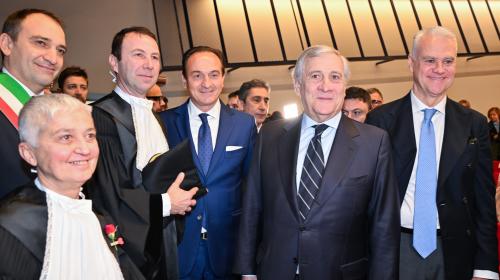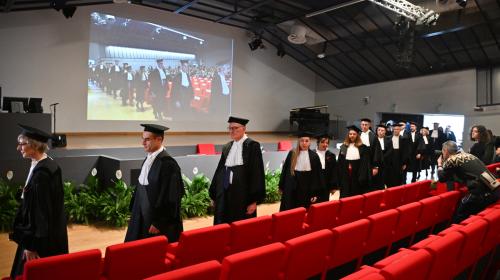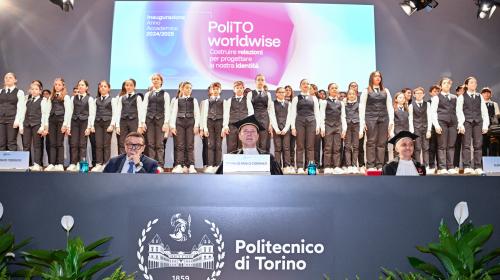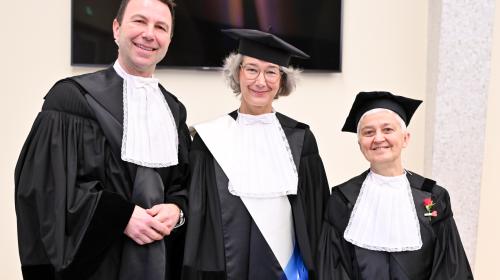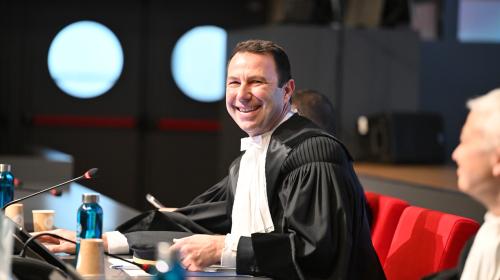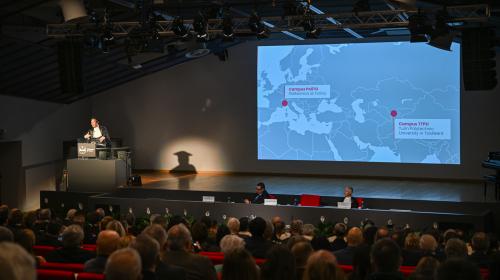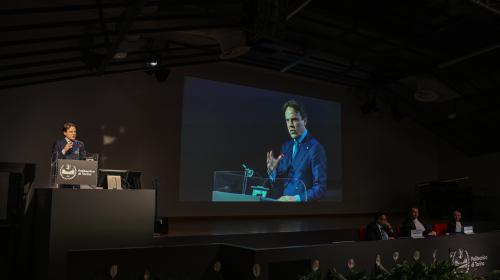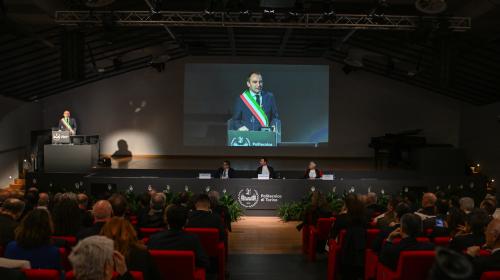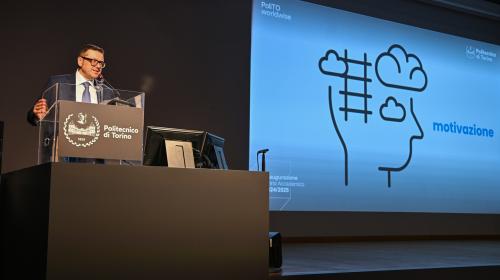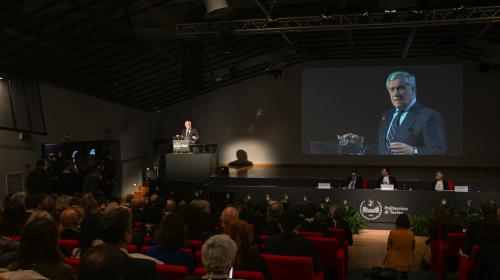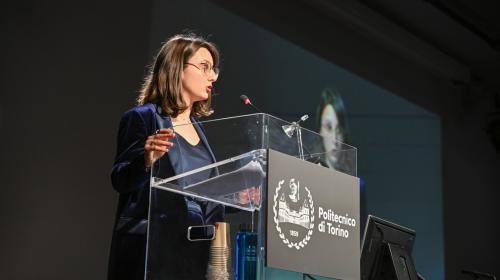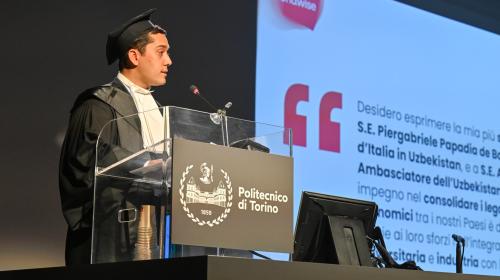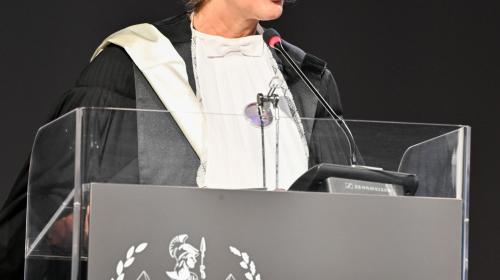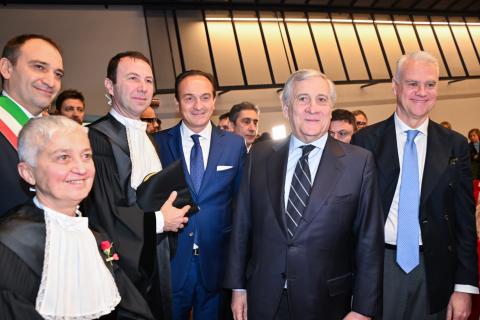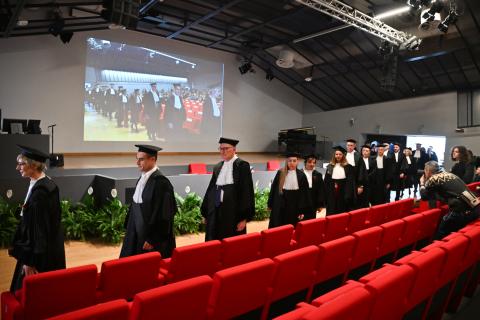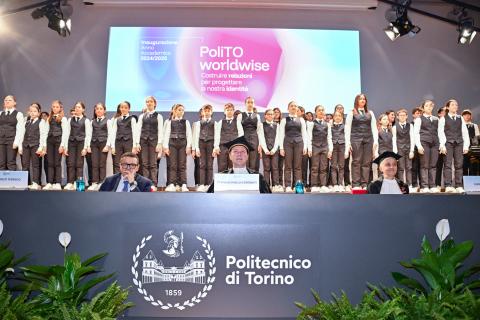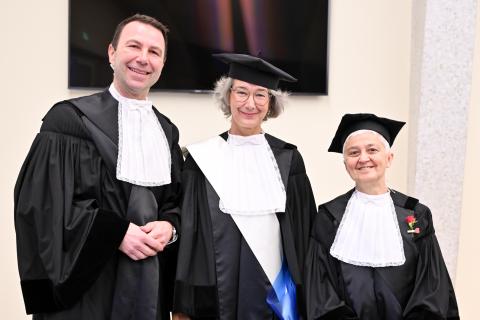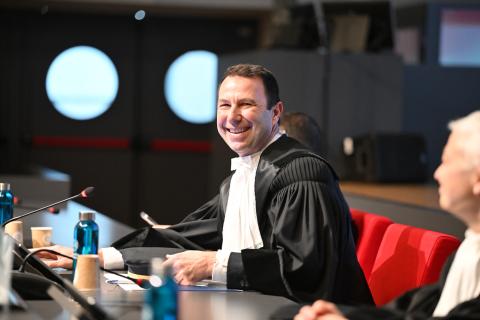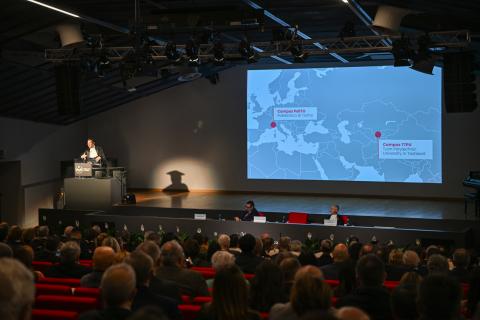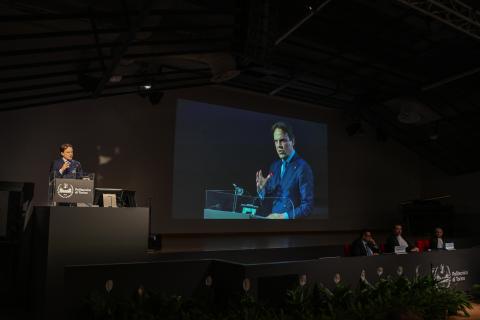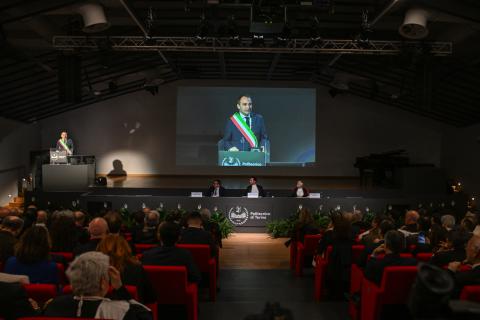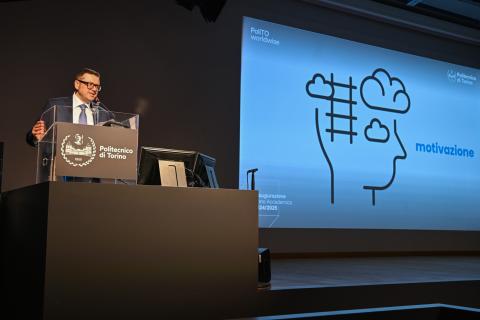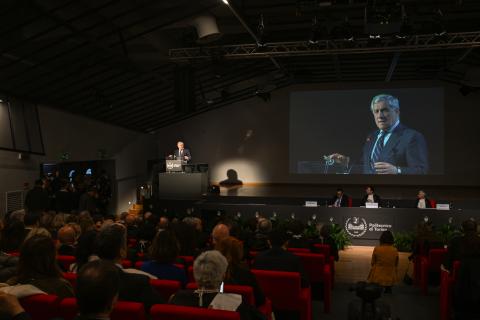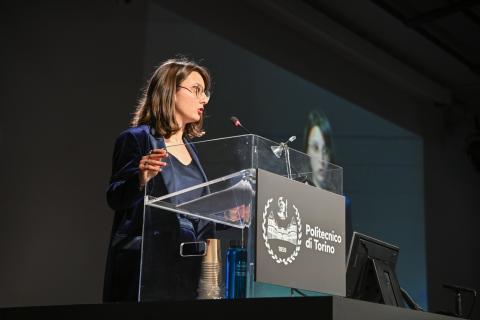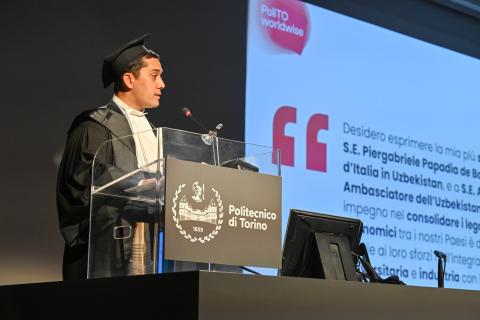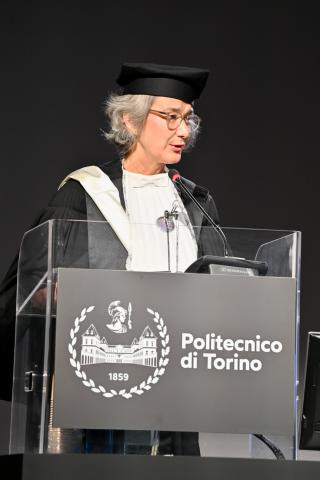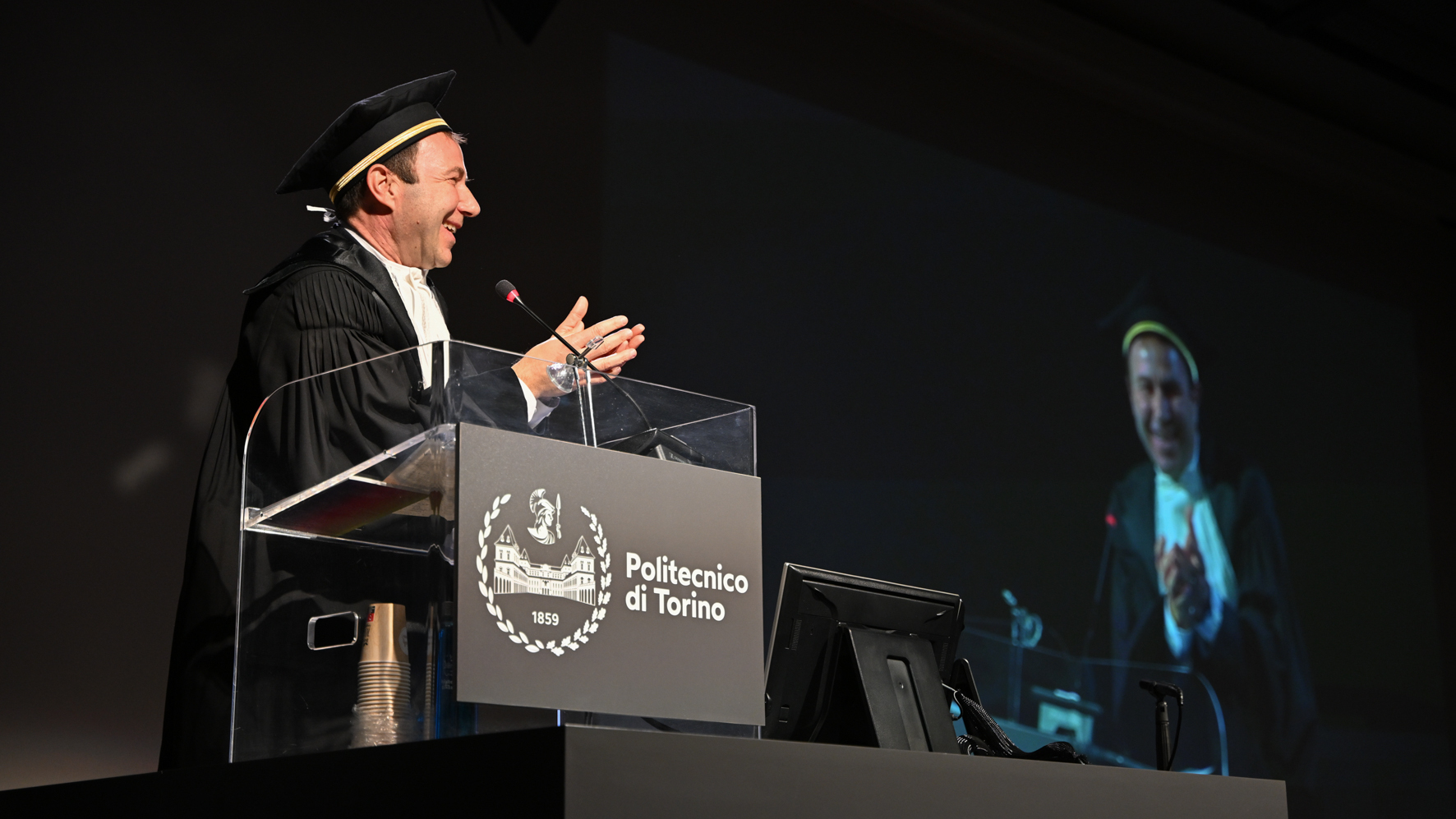
From Turin to the world: inauguration of the new Academic Year of Politecnico di Torino
The development of international relations is one of the three pillars of the Politecnico's new Strategic Plan "PoliTOinTransition”,which outlines the main actions Politecnico will undertake to achieve a series of ambitious goals by 2030: from the renewal of study paths, to collaboration with the best international research networks, towards being a support for policy makers at the European level and beyond. An international vocations that was the focus of Politecnico's opening ceremony of Academic Year 2024/2025, held this morning.
Starting from the European Union, Politecnico wants to open up more and more to non-EU countries, where to strengthen relations with universities, research centers, the business world and institutions. "Given nowadays international landscape, facing a complex, unstable geopolitical framework, Politecnico di Torino is growingly fostering a collaborative intent, creating bridges of dialogue, and erasing the frontiers of the free movement of ideas and people. Only an environment with an international scope makes possible to face the great transitions of our time, providing flanking and support to our entire territorial ecosystem as well," explained Rector Stefano Corgnati in his speech. "Considering education, the scenario that sees us projected to prevent demographic contraction requires us to start developing a policy of attracting talent from all over the world by benefiting from the more than 80 double degrees with our partner universities network. We are attractive because we have a solid educational quality, but also because the city is attractive, with its quality of life and services for students, also considering our local excellences. We are attractive because our educational offerings focus on an experiential approach, based on design and doing, collaborating with businesses, sector professionals and public administration: at Politecnico, abstract thinking becomes applied knowledge. Here young people grow up, here they must have opportunities to stay or come back, because here they want to build their future."
A dimension, the international one, that is increasingly strategic for the Turin and Piedmont territory, as local institutions recalled during their greetings. The Mayor of the City of Turin Stefano Lo Russo stated: “The international dimension has been at the core of Politecnico di Torino actions since its foundation. I greet the Rector of Taskshent Polytechnic (TTPU), who has honoured us being here in presence, and has collaborated in the realization of one of the best experiences of internationalization and rationalization of the Italian university system." Andrea Tronzano, Councillor for Budget, Productive Activities and Internationalization of Piedmont Region, then emphasized the joint action of local institutions in the international and production sectors: "Institutional collaboration is crucial for achieving results that were previously unthinkable, this being a moment of transition, which can become great development opportunity, key to our region."
Universities internationalization can also be a resource for the country, as Politecnico Director General Vincenzo Tedesco mentioned, "Attracting foreign talent here means helping our development, our companies, and offering Italy another factor of attractiveness besides tourism. Internationalization means binding to Italy and to our culture young women and men who will soon be, in their countries of birth, the best partners for our companies and the best ambassadors of our country. To do all this properly, Politecnico must strengthen its organizational culture by defining stable structures to support its missions, enhancing the training of the whole administrative staff to become the core asset for continuous improvement in the wake of the administrative simplification, nowadays key to public administration and particularly to universities."
The key aspect of relations between our country and the world, which entails education and the University in particular, was then the focus of the speech of the Italian Vice-President of the Council of Ministers and Minister of Foreign Affairs and International Cooperation Antonio Tajani: "Education, at all levels, is an effective tool for public, cultural, scientific and innovation diplomacy. Strategic, for a country like Italy, is the role that education, school and university, can play as a feature of linguistic, cultural and economic promotion and consolidation of relations with people, communities and countries, even geographically distant ones, favouring mutual knowledge, dialogue, exchange of skills and abilities. For this reason, I would like to emphasize the importance of strengthening Italy's ability to attract young international talent. This is in the belief that the international attractiveness of our educational model is a source of significant economic returns and interconnection between civil societies. Foreign citizens trained in our educational system, in Italy or abroad, will be the ambassadors of Italy in the world. The goal is to make our universities, schools and excellence centres, in Italy and abroad, the training grounds of future international ruling classes, naturally inclined to establish fruitful political dialogue and relations with Italy. In this global framework, Politecnico di Torino represents an excellence of Italian knowledge and know-how, vigorously projected towards future and innovation."
Cristina Annese, as a representative of students in the Academic Senate, stressed that "Education cannot be reduced to an accumulation of notions, but becomes a multifaceted experience that helps us grow in our humanity. However, since knowledge is a relationship, this growth does not occur in solitude, but is nourished by sharing and mutual confrontation. Indeed, our humanity remains incomplete if we do not perceive ourselves 'together'."
Two direct testimonies of international university experiences also stated the relevance of Politecnico’s opening to the world. The Rector of Turin Polytechnic University in Tashkent Olimjon Tuychiev recalled the collaboration with Politecnico di Torino in Uzbekistan: "Currently, about 2,000 students are enrolled at TTPU, eager to gain an excellent training thanks to Politecnico di Torino’s educational offerings. At the same time, we are pleased to see that 50 Uzbek students are continuing their studies at PoliTO, thus contributing to further strengthening the bilateral academic ties between our countries." European University Institute President Patrizia Nanz then intervened on the role of universities in the international scenario: "We need to stop rushing and take the time to think about the innovation that Europe needs for a radical transformation in the face of the current ecological and geopolitical crisis" President Nanz commented. "Universities, united across disciplines, provide the essential venue for the needed informed debate aimed at guiding innovation policies and ensuring their concrete adherence to the real needs of society."
Finally, the Italian Minister of Public Administration Paolo Zangrillo also joined the inauguration, demonstrating the core relevance of this issue and the numerous related discussions initiated with Politecnico di Torino in recent months.
